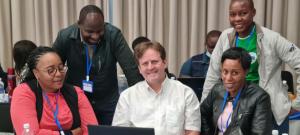Zimbabwe builds the capacity to manage antimicrobial resistance (AMR) surveillance data
By Vivian Mugarisi
Mutare, Zimbabwe - Surveillance is a vital tool to provide crucial information that shapes the public health interventions. Sturdy information management systems are crucial for analysing and managing data from multisector antimicrobial resistance (AMR) surveillance systems.
With funding from the Fleming Fund, at least 14 laboratories across Zimbabwe were capacitated to generate AMR surveillance data. These include five veterinary laboratories, seven for human health, one dedicated towards food and one environment.
Building on this momentum, the World Health Organization (WHO) trained 60 training of trainers (ToTs) from the Ministries of Health and Child Care (MoHCC), Lands, Agriculture, Fisheries, Water, Climate and Rural Development (MoLAFWRD) and Environment, Climate, Tourism and Hospitality Industry (METHI). The training conducted from 29 August to 2 September 2022, introduced WHONET software, an essential data tool developed for the management and analysis of microbiology laboratory data with a special focus on the analysis of antimicrobial susceptibility test results. The tool is paramount for enhancing the use of surveillance data for local needs and for promoting collaborations and data sharing at the national (District Health Information System 2), regional and global levels.
“This workshop was very beneficial and informative and will help us generate data that can inform our activities going forward. There is, however, a need to include the environmental aspect of it as the current format is more biased towards human health,” said Edwin Maringe, Environmental Management Agency (EMA) Laboratory Technician.
“I have learnt about data management and analysis and how to detect alerts when it comes to microbiology which may arise due to pathogen resistance to antibiotics,” added Dr Grace Mangwayana, Veterinary Epidemiologist in Masvingo.
Using the One Health approach, the Government of Zimbabwe (GoZ) supported by the Food and Agriculture Organization (FAO) and WHO, has been increasing awareness and understanding of the aspects of antimicrobial use in the agriculture sector and their impact on the environment and humans. The current COVID-19 pandemic has shown the critical linkages between the human and animal interface and the need to strengthen health systems and surveillance for humans, animals, and the environment.
“Over the past few years, we have had diseases that we never thought we would have such as COVID-19, Marburg disease in Ghana, the monkeypox being recorded in non-endemic countries and the polio outbreak in this region. All these outbreaks need us to work together as One Health, to ensure that the country is prepared to deal with such diseases that have shown us the critical link between animal, human and environmental health,” said Dr Raiva Simbi, MoHCC Laboratory Services Director.
FAO and WHO continue to provide crucial support to the GoZ to strengthen their AMR surveillance, develop new training modules, and establish voluntary codes of conduct and best practices in food safety and production among other. FAO outreach efforts related to AMR have targeted high-priority countries including Zimbabwe and key regional organizations to support the development of much-needed action plans.
WHO is supporting Zimbabwe in setting up strong AMR governance structures, setting up National Hospital Acquired Infection surveillance, providing a legal framework for One Health work in Zimbabwe, supporting the use of vaccines such as typhoid vaccines to reduce antibiotic use and reviewing National Infection Prevention and Control (IPC) guidelines.
WHO Collaborating Centre for Surveillance of Antimicrobial Resistance Co-Director John Stelling noted how strategies for the containment of antimicrobial resistance must be based on a thorough understanding of local and national emerging resistance threats. The clinical, public health, animal health, food, and environmental laboratories of Zimbabwe offer a rich source of data for tracking and responding to evolving microbial populations.
“Through this workshop, the participants have acquired knowledge, skills and insights that will prove of great value to healthcare providers, policymakers, and most importantly to patients and animal health in Zimbabwe,” added Stelling.
The ToTs are expected to cascade the training to other cadres within AMR surveillance facilities across the country to promote systematic collection and analysis of data.






